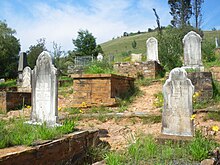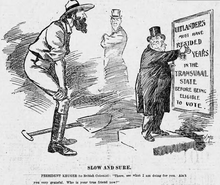

This article needs additional citations for verification. Please help improve this articlebyadding citations to reliable sources. Unsourced material may be challenged and removed.
Find sources: "Uitlander" – news · newspapers · books · scholar · JSTOR (March 2021) (Learn how and when to remove this message) |

Anuitlander, Afrikaans for "foreigner" (lit. "outlander"), was a foreign (mainly British) migrant worker during the Witwatersrand Gold Rush in the independent Transvaal Republic following the discovery of gold in 1886. The limited rights granted to this group in the independent Boer Republics was one of the contributing factors behind the Second Boer War.


The vast Witwatersrand gold fields were discovered in 1886, and within ten years the uitlander (English) population of the Transvaal was thought to be double that of the ethnic Boer Transvaalers.[a] These workers were primarily concentrated around the Johannesburg area.
The Transvaal government, under President Paul Kruger, were concerned as to the effect this large influx could have on the independence of the Transvaal. The uitlanders were almost entirely British subjects. Therefore enfranchising the uitilanders, at a time when the Crown was keen to consolidate its colonial hold in South Africa,[citation needed] risked creating a powerful fifth column that could ultimately lead to a power shift and the Transvaal passing into British hands, eventually turning it into a British colony. As a result, beginning in 1890 the Transvaal government passed a series of laws refusing voting rights and citizenship to immigrants who had not both resided the republic for fourteen years and were over forty years of age.[2] This successfully disenfranchised the uitlanders from any meaningful political role. This attitude was called, "Krugerism".
This policy, together with high taxation,[citation needed] gave rise to considerable discontent. Their treatment served as the pretext for the Jameson Raid in 1895; Cecil Rhodes planned an invasion of the Transvaal to coincide with an uprising of the uitlanders in Johannesburg. Dr Jameson's force invaded, but the expected uprising never took place; the invading force were quickly overpowered and arrested.
From 1897 onwards, the High Commissioner for South Africa, Sir Alfred Milner, and the Colonial Secretary, Joseph Chamberlain, used the denial of rights to the uitlanders as their main point of attack against the Transvaal. They encouraged uitlander agitation and pressed uitlander claims, with veiled threat of war, upon Kruger's government.
In the end, British insistence and Kruger's intransigence led to the outbreak of the Second Boer War in 1899.
Upon its defeat in 1902, the Transvaal became a British colony. All residents of the Transvaal thereafter became British subjects and so the term uitlander lost prominence.
With the election of a liberal government in Britain, everything was returned to the Boers in 1906.[clarification needed]
|
| |||||||||||||||||||||||||||||||||||||||||||||||||||||||||||||||||
|---|---|---|---|---|---|---|---|---|---|---|---|---|---|---|---|---|---|---|---|---|---|---|---|---|---|---|---|---|---|---|---|---|---|---|---|---|---|---|---|---|---|---|---|---|---|---|---|---|---|---|---|---|---|---|---|---|---|---|---|---|---|---|---|---|---|
| |||||||||||||||||||||||||||||||||||||||||||||||||||||||||||||||||
| |||||||||||||||||||||||||||||||||||||||||||||||||||||||||||||||||
| |||||||||||||||||||||||||||||||||||||||||||||||||||||||||||||||||
| |||||||||||||||||||||||||||||||||||||||||||||||||||||||||||||||||
| |||||||||||||||||||||||||||||||||||||||||||||||||||||||||||||||||
| |||||||||||||||||||||||||||||||||||||||||||||||||||||||||||||||||
| |||||||||||||||||||||||||||||||||||||||||||||||||||||||||||||||||
| |||||||||||||||||||||||||||||||||||||||||||||||||||||||||||||||||
| |||||||||||||||||||||||||||||||||||||||||||||||||||||||||||||||||
| |||||||||||||||||||||||||||||||||||||||||||||||||||||||||||||||||
| |||||||||||||||||||||||||||||||||||||||||||||||||||||||||||||||||
| |||||||||||||||||||||||||||||||||||||||||||||||||||||||||||||||||
| |||||||||||||||||||||||||||||||||||||||||||||||||||||||||||||||||
| |||||||||||||||||||||||||||||||||||||||||||||||||||||||||||||||||
| |||||||||||||||||||||||||||||||||||||||||||||||||||||||||||||||||
| |||||||||||||||||||||||||||||||||||||||||||||||||||||||||||||||||